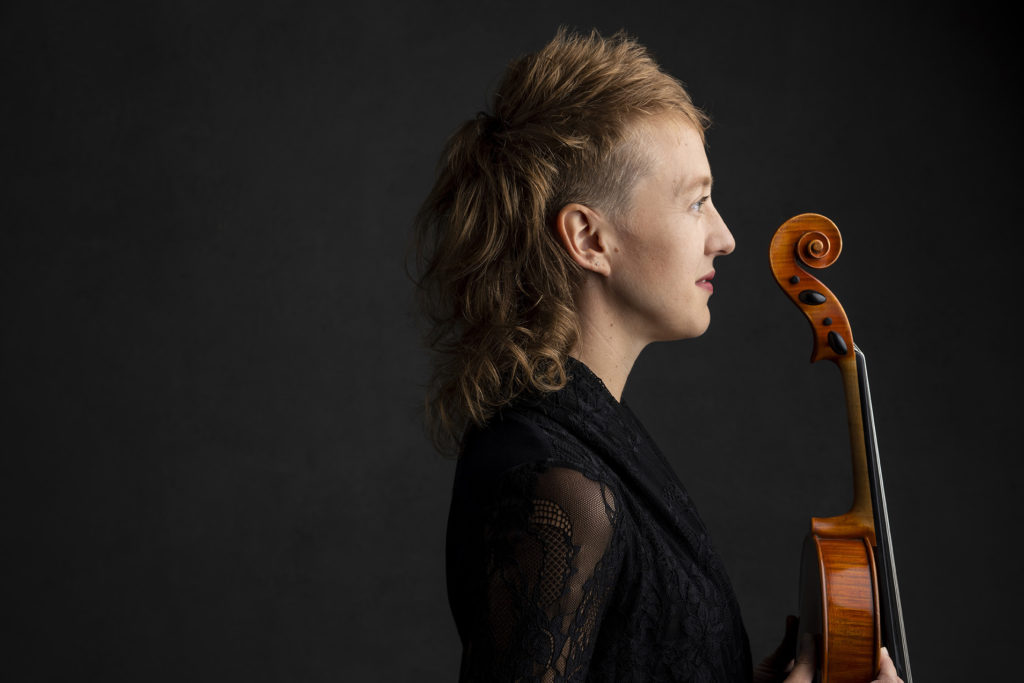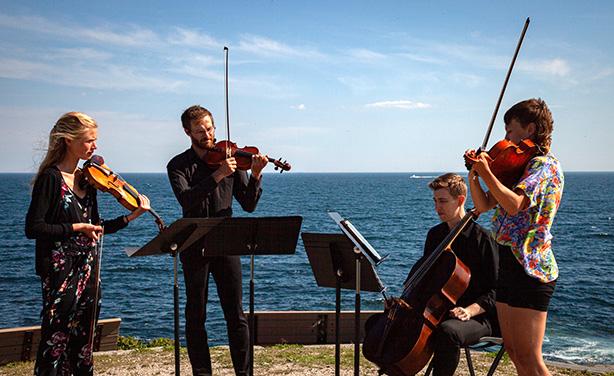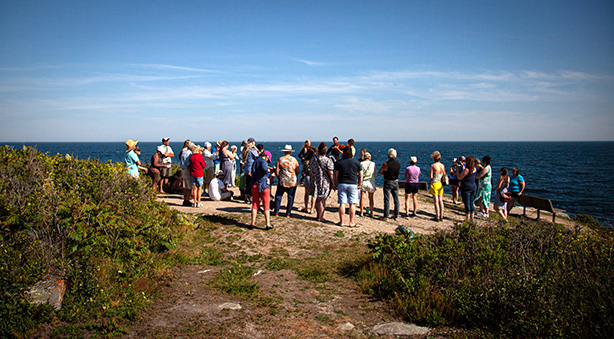A Musician Brings Classical Music to Maine’s Outdoors
Violist Kal Sugatski’s experimental concert series Vigorous Tenderness connects audiences with a new kind of classical music.

On last year’s shortest day, in a dark and snowy field on Broadturn Farm, a half an hour from Portland, Kal Sugatski was hitting a piano with a sledgehammer. The piece they had planned was Annea Lockwood’s “Piano Burning” from 1968, the instructions for which are simple: spill a little lighter fluid on a twist of paper and place it near the pedals, light it, and play whatever pleases you for as long as you can. An additional note specifies that the piano used should be already beyond repair. But, 15 minutes before Sugatski’s show, the fire department had informed them that they could not set fire to the piano that night.
During the darkest days of the pandemic Sugatski started Vigorous Tenderness, an outdoor, socially distanced, classical and experimental concert series, as a way to bring musicians and Mainers back together. The Portland-raised violist trained in high school under Julia Adams and the other founding members of the Portland String Quartet, then went on to perform with the New York City Ballet, the New York City Opera, and every major New Music ensemble in the city, as well as in Broadway shows such as The Lion King and Dear Evan Hansen. “I was really dissatisfied that during the pandemic music could only be made and shared over computers and phones,” they say. “For me the interaction inherent in chamber music—this beautiful blend of solo playing and ensemble playing, where you have your own voice but it’s also deeply collaborative—could not be translated online and could not be replaced.”
The pandemic provided an opportunity for Sugatski to return to their home state, at least for a time. They say they have always wanted to live in Maine, but that desire has been at odds with sustaining their performance career. Musicians here, like their mom and dad, a bass player and a jazz drummer, must either play and have another job or play and teach, they say. “There are excellent musicians in Maine,” they say, “but there are not enough music jobs in Maine, not enough opportunities for people to make a living as performers.”
But Sugatski is someone who loves to solve problems. Vigorous Tenderness was created, first and foremost, as way to introduce more people to New Music, which, according to Sugatski, is contemporary music that expands what we think of as music: “To innovate on the sounds of a classical instrument that was made 300 years ago in Italy out of a tree,” they say. “To expand what that instrument can do and how that instrument can sound.”

A huge part of broadening the boundaries of music and giving audiences new ways to understand, interact with, and respond to it—beyond Bach symphonies in concert halls—is to open up the canon. “As classical musicians we have the responsibility to fix what classical music is,” Sugatski says. “It has this horrible, harmful, racist, white supremacist, sexist history. It’s this incredible art form that I believe in so deeply. I want to see it thrive, but it can’t do that without more voices being amplified, more voices heard.”
Sugatski first began championing music written in their lifetime with their group Feminist Counterpoint, which they began in Brooklyn ten years ago. Through this solo project, Sugatski commissions new works by women, trans, and nonbinary composers. Most of the concerts happen in alternative concert venues, like their amplified recital in the middle of Times Square, or their workshop and performance at Girls Rock Camp in Oakland, California, where Sugatski went to connect with young, nonclassical musicians and to “draw some parallels between what they were doing at Girls Rock Camp and what I was doing with my viola, a speaker, and some electronics.”
Vigorous Tenderness expands on the Feminist Counterpoint project, but it embraces composers of all genders, and each concert takes place in a different beautiful Maine location, whether a state park, along the Eastern Prom, or at an urban farm. “Feeling so connected to the environment in Maine has inspired me to curate music that shares that connection,” Sugatski says. “We’ve had music on a cliff with wind and waves in the background, these environmental sounds. Or one piece being played in the forest and another piece on the beach [simultaneously], and the sounds from each bleeding into each other while listeners move between the two different ensembles.” While Vigorous Tenderness began with concerts on the equinoxes and solstices as a way of marking time during a period of seeming timelessness, there have already been offshoot concerts, especially during the past summer when it was easier to gather outside.
But the concert at Broadturn Farm was decidedly in winter. Southern Maine’s first thick coating of snow had fallen just a few days before, and Sugatski spent those days transforming the farm into a magical venue, with bonfires scattered over the terrain and 400 feet of string lights hung to illuminate the various couplings of musicians and provide warmth to the masked, socially distanced attendees.

“I woke up feeling like no one was going to come,” Sugatski says. “It was a freezing-cold weeknight before Christmas.” But then 450 people showed up. Knowing “Piano Burning” couldn’t go as planned, they made a last-minute change: they told the pianist to perform, but instead of having flames licking at their feet and waiting until they force them to stop, they should finish playing, stand, and take a swing at the instrument with a sledgehammer. “I then invited each member of the audience to join in a community destruction of the piano,” says Sugatski. “It became even more meaningful than last year’s performance. What is sound? What is music?” As the piano broke down, it created a wild resonance, with effervescent overtones that rang out over the landscape, a glittering of piano strings.
“I’m not sure there’s been another New Music concert in this country in this year that’s had 450 people attend,” Sugatski says. “It made me so thankful for this Maine community. A place where people show up in their boots and their headlamps willing to have this kind of experience and to foster these kinds of connections. I’m not sure it could work anywhere else.”
Read More:
- The Immortal Life of Holly Meade

- “Beyond the Brick” Brings Maine-Made Art and Music to Life

- Watercolor Painter Abe Goodale Traces His Roots on 700 Acre Island

- Shifting Dynamics Through the Power of Theater


